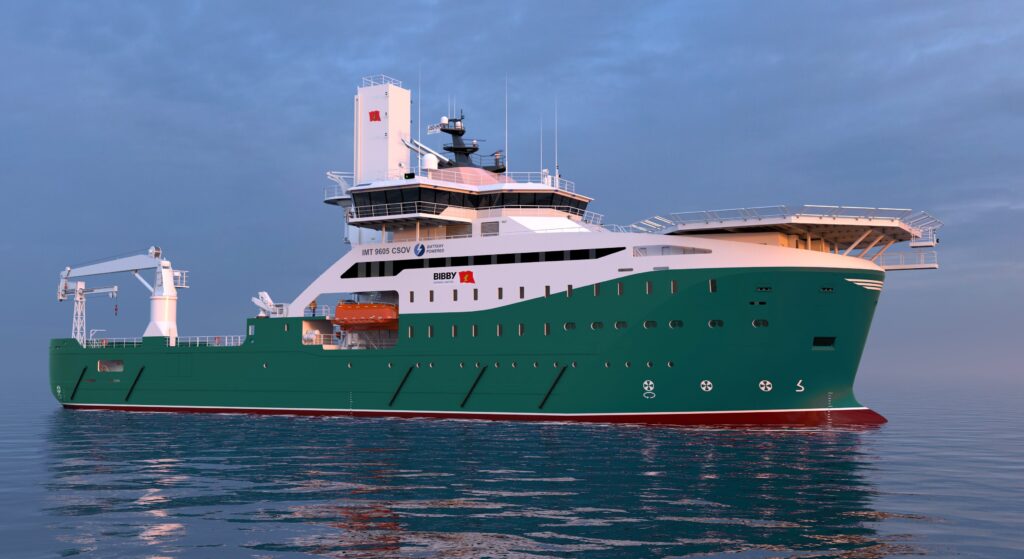Bibby Marine is delighted to announce it has signed a shipbuilding contract, to build the world’s first truly zero-emission, electric Commissioning Service Operation Vessel (eCSOV), with shipbuilders, Gondan.
The eCSOV will be built in Gondan’s Asturias shipyard in Spain and is scheduled to be delivered in 2026.
After a thorough tendering process involving a variety of yards in the UK and overseas, Gondan Shipbuilders was selected by Bibby Marine, with an offer that stood out in terms of timeline, budget and quality. Their proven track record in building bespoke, specialist vessels was also a strong factor in selecting Gondan to build this innovative vessel.
The eCSOV, which has been designed in collaboration with UK-based ship designers Longitude, will feature a powerful battery system, complemented by dual-fuel methanol engines for emissions-free operations. The vessel will be equipped with industry leading mission equipment, a spacious insulated warehouse and climate controlled electrical store. Ensuring comfort for crew members, the vessel will provide top-tier accommodation with generous communal areas and comfortable cabins. To facilitate zero-emission operations, the eCSOV will feature high-voltage offshore charging facilities for rapid recharging. With the capability to operate solely on battery power for over 16 hours between charging cycles, the vessel is primed for efficient field operations. Our eCSOV guarantees superior fuel efficiency, setting a new standard in the industry.

Bibby Marine CEO, Nigel Quinn, Bibby Marine said: “This is an exciting next step for our project, and we are delighted to have found a partner in Gondan Shipbuilders, who will bring our clean vision to life.
“Gondan’s 100 year-experience of building ships and more recent experience of building ships to suit a low / no carbon future, aligns closely with our own history and vision, which meant it stood out as a yard to help us deliver our eCSOV.”
He added: “As a UK owned company, we are pleased this vessel will be the first UK designed CSOV and a UK flagged vessel. We will continue to work alongside our established supply chain and local academia, to ensure UK shipyards are engaged, and have the opportunity to learn, throughout the process. We want this project to support the ambition to turn the UK into the world’s number one centre for green technology.
“The delivery of this vessel has the potential to be a game changer for our industry by accelerating our path to net-zero, as well as showcasing marine innovation at its finest. This project will demonstrate that clean ships can be built at the same total cost of ownership as a conventional fossil burning vessel, coupled with significantly reduced operating costs.”
Daniel Scavuzzo, Sales Director of Gondan Shipbuilders stated: “We are excited to begin this journey with Bibby Marine, who are at the forefront of offshore wind and committed to decarbonising the maritime sector. This project fits seamlessly with our expertise in zero-emission technologies.”
Bibby Line Group CEO, Jonathan Lewis said: “As a family-owned business, we pride ourselves on being able to take a long-term perspective.
“Following our group restructure in 2020, significant investment in our more focused portfolio of core businesses is resulting in improved group performance and allowing us to invest for future growth – putting Bibby very much back on the front foot in our respective sectors.
He added “I am delighted that we are investing into world-leading green technology within the marine sector, in which we have operated throughout our 200+year history. This investment has been made possible by the dedicated and skilled people who are part of Bibby Marine and the broader Bibby Line Group.
This project is part of the Zero Emission Vessels and Infrastructure (ZEVI) scheme, funded by the UK Department for Transport (DfT) and delivered by Innovate UK. ZEVI is part of the Department’s UK Shipping Office for Reducing Emissions (UK SHORE) programme, a £206m initiative focused on developing the technology necessary to decarbonise the UK domestic maritime sector.


Comments are closed